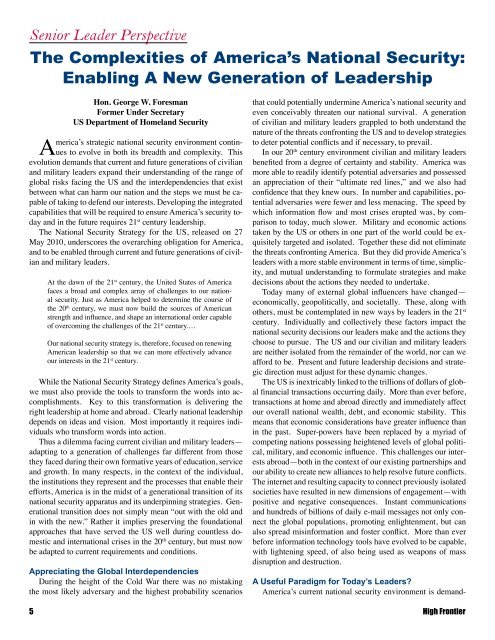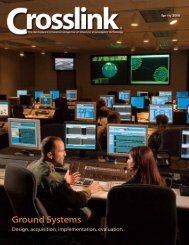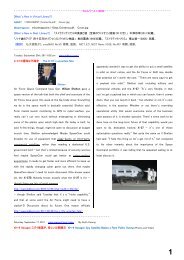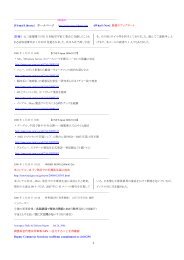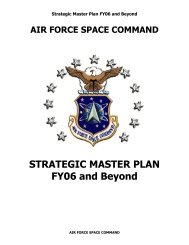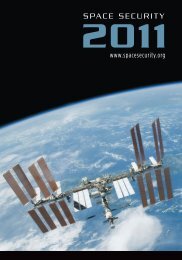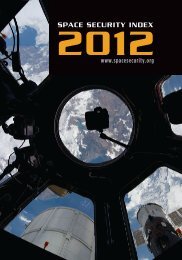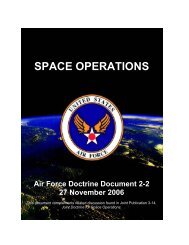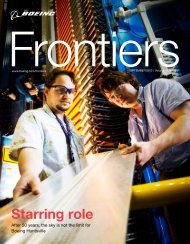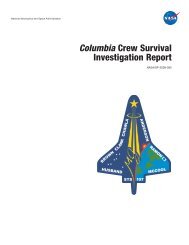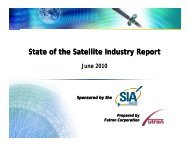Schriever Wargame 2010 - Air Force Space Command
Schriever Wargame 2010 - Air Force Space Command
Schriever Wargame 2010 - Air Force Space Command
Create successful ePaper yourself
Turn your PDF publications into a flip-book with our unique Google optimized e-Paper software.
Senior Leader Perspective<br />
The Complexities of America’s National Security:<br />
Enabling A New Generation of Leadership<br />
Hon. George W. Foresman<br />
Former Under Secretary<br />
US Department of Homeland Security<br />
America’s strategic national security environment continues<br />
to evolve in both its breadth and complexity. This<br />
evolution demands that current and future generations of civilian<br />
and military leaders expand their understanding of the range of<br />
global risks facing the US and the interdependencies that exist<br />
between what can harm our nation and the steps we must be capable<br />
of taking to defend our interests. Developing the integrated<br />
capabilities that will be required to ensure America’s security today<br />
and in the future requires 21 st century leadership.<br />
The National Security Strategy for the US, released on 27<br />
May <strong>2010</strong>, underscores the overarching obligation for America,<br />
and to be enabled through current and future generations of civilian<br />
and military leaders.<br />
At the dawn of the 21 st century, the United States of America<br />
faces a broad and complex array of challenges to our national<br />
security. Just as America helped to determine the course of<br />
the 20 th century, we must now build the sources of American<br />
strength and influence, and shape an international order capable<br />
of overcoming the challenges of the 21 st century.…<br />
Our national security strategy is, therefore, focused on renewing<br />
American leadership so that we can more effectively advance<br />
our interests in the 21 st century.<br />
While the National Security Strategy defines America’s goals,<br />
we must also provide the tools to transform the words into accomplishments.<br />
Key to this transformation is delivering the<br />
right leadership at home and abroad. Clearly national leadership<br />
depends on ideas and vision. Most importantly it requires individuals<br />
who transform words into action.<br />
Thus a dilemma facing current civilian and military leaders—<br />
adapting to a generation of challenges far different from those<br />
they faced during their own formative years of education, service<br />
and growth. In many respects, in the context of the individual,<br />
the institutions they represent and the processes that enable their<br />
efforts, America is in the midst of a generational transition of its<br />
national security apparatus and its underpinning strategies. Generational<br />
transition does not simply mean “out with the old and<br />
in with the new.” Rather it implies preserving the foundational<br />
approaches that have served the US well during countless domestic<br />
and international crises in the 20 th century, but must now<br />
be adapted to current requirements and conditions.<br />
Appreciating the Global Interdependencies<br />
During the height of the Cold War there was no mistaking<br />
the most likely adversary and the highest probability scenarios<br />
that could potentially undermine America’s national security and<br />
even conceivably threaten our national survival. A generation<br />
of civilian and military leaders grappled to both understand the<br />
nature of the threats confronting the US and to develop strategies<br />
to deter potential conflicts and if necessary, to prevail.<br />
In our 20 th century environment civilian and military leaders<br />
benefited from a degree of certainty and stability. America was<br />
more able to readily identify potential adversaries and possessed<br />
an appreciation of their “ultimate red lines,” and we also had<br />
confidence that they knew ours. In number and capabilities, potential<br />
adversaries were fewer and less menacing. The speed by<br />
which information flow and most crises erupted was, by comparison<br />
to today, much slower. Military and economic actions<br />
taken by the US or others in one part of the world could be exquisitely<br />
targeted and isolated. Together these did not eliminate<br />
the threats confronting America. But they did provide America’s<br />
leaders with a more stable environment in terms of time, simplicity,<br />
and mutual understanding to formulate strategies and make<br />
decisions about the actions they needed to undertake.<br />
Today many of external global influencers have changed—<br />
economically, geopolitically, and societally. These, along with<br />
others, must be contemplated in new ways by leaders in the 21 st<br />
century. Individually and collectively these factors impact the<br />
national security decisions our leaders make and the actions they<br />
choose to pursue. The US and our civilian and military leaders<br />
are neither isolated from the remainder of the world, nor can we<br />
afford to be. Present and future leadership decisions and strategic<br />
direction must adjust for these dynamic changes.<br />
The US is inextricably linked to the trillions of dollars of global<br />
financial transactions occurring daily. More than ever before,<br />
transactions at home and abroad directly and immediately affect<br />
our overall national wealth, debt, and economic stability. This<br />
means that economic considerations have greater influence than<br />
in the past. Super-powers have been replaced by a myriad of<br />
competing nations possessing heightened levels of global political,<br />
military, and economic influence. This challenges our interests<br />
abroad—both in the context of our existing partnerships and<br />
our ability to create new alliances to help resolve future conflicts.<br />
The internet and resulting capacity to connect previously isolated<br />
societies have resulted in new dimensions of engagement—with<br />
positive and negative consequences. Instant communications<br />
and hundreds of billions of daily e-mail messages not only connect<br />
the global populations, promoting enlightenment, but can<br />
also spread misinformation and foster conflict. More than ever<br />
before information technology tools have evolved to be capable,<br />
with lightening speed, of also being used as weapons of mass<br />
disruption and destruction.<br />
A Useful Paradigm for Today’s Leaders?<br />
America’s current national security environment is demand-<br />
5 High Frontier


